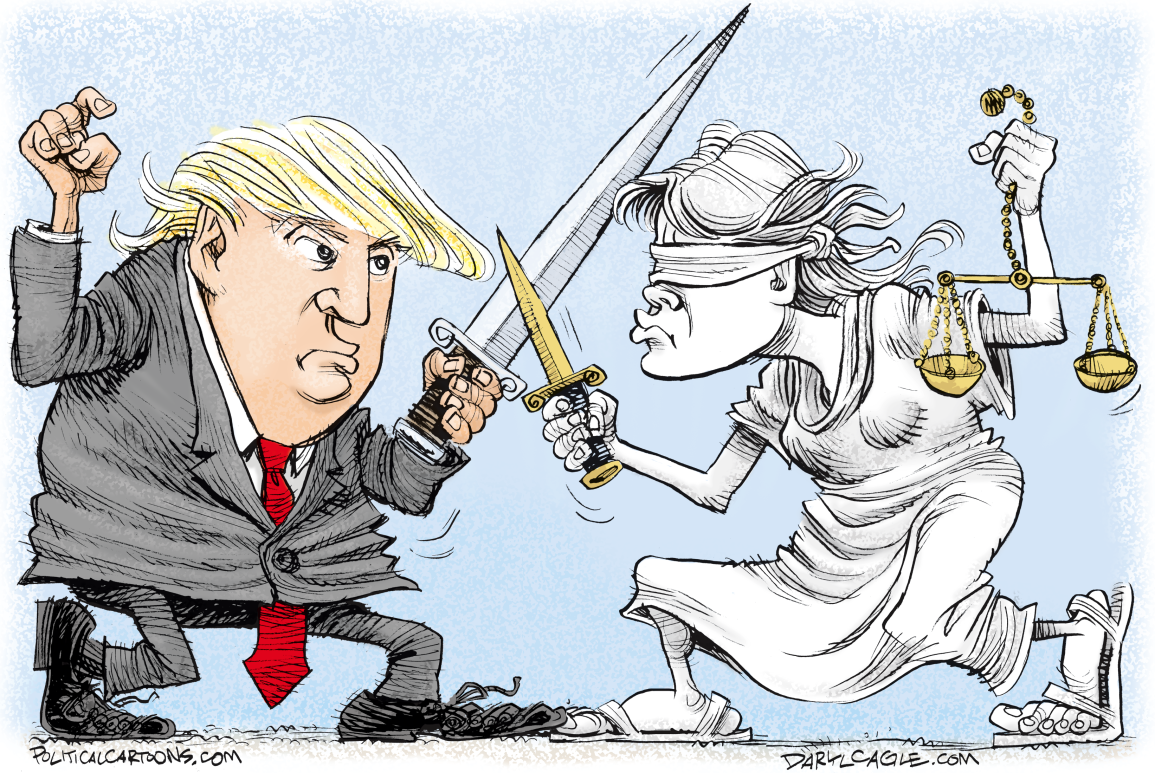
The good news is that the United States still has an independent legal system, able to stop the president’s abuse of power. The bad news is that the president has launched a vicious campaign of denigration and intimidation of American judges that is without precedent. Well, maybe not totally without precedent …
In 1832, President Andrew Jackson may have challenged Chief Justice John Marshall to go enforce his decision affirming Indian sovereignty over land himself. A century later, Franklin Delano Roosevelt, faced with an ultra-conservative Supreme Court that invalidated all progressive laws, threatened to increase the number of judges from nine to 15. There was no Twitter then, but he still publicly criticized the court for its “horse-and-buggy” vision of certain concepts. The commentators in the media attacked Roosevelt for this criticism of the legal system, and he dropped his threat.
Historical precedents don’t make Donald Trump’s repeated attacks of the last two days any less serious. The president of the United States hasn’t come to terms with the fact that a “so-called judge” is suspending his order to block the entry of immigrants from seven majority Muslim countries for 90 days, as well as the arrival of refugees in general for 120 days.
At 3:48 p.m. yesterday, he was writing on Twitter again:
“Just cannot believe a judge would put our country in such peril. If something happens blame him and court system. People pouring in. Bad!”
This is not the first person, or the first judge, that Trump has insulted, except that today, he’s president, and therefore the head of the American executive branch. Attacking a political opponent is fair game. But personally attacking a judge is violating the separation of powers.
The attacks are particularly vicious because they don’t just target the “ridiculous” decision, but the man himself.
Trump goes so far as to suggest that if a terrorist attack is ever committed in the United States, it will be the fault of the judge and the whole system! However, this judge, who was chosen by a Republican president and confirmed unanimously in the Senate, is only applying the law.
In addition to lawsuits from civil liberties organizations, the state of Washington last week filed for an injunction to block the presidential order.
The state alleged that its economy would be greatly affected if citizens from the seven countries were prevented from arriving. Currently, 7,280 people in Washington state benefit from an H-1B visa, which allows highly qualified employees to come work in the United States. This state is notably home to the headquarters of Microsoft, which employs thousands of immigrants.
The state also pleaded that the executive order is arbitrary — why these countries? It discriminates without showing a legally valid reason to prevent people coming to the U.S. from these countries, which are — surprise, surprise — mostly Muslim. Looking back over Trump’s statements during his campaign, you can see that he entertains the idea of a ban on the entry of Muslims. Clearly, this order had to be given a semblance of legality, hence the choice of the seven countries, which had already been identified as being connected with terrorist acts in the world.
A permanent injunction will be debated later, but given the urgency, the Washington state attorney general asked for an immediate suspension of the presidential order, which judge James Robart granted Friday in a very brief ruling.
The judge reminded us that the three branches of government are equal, that no one is superior to the others. That the role of judges isn’t to make laws or to judge the wisdom of political decisions, but simply to judge their conformity with the laws and the Constitution.
Given the personal and economic consequences, the judge held that “irreparable injury” would occur if the order was not suspended until the final decision on the validity of the order were made. Hence the temporary suspension.
U.S. civil servants complied and visa holders from the affected countries were able to resume their arrival in the United States. An appeal [of the Judge Robart’s order] was to be heard Tuesday.*
Judges may well be chosen by an administration, but they aren’t politicians, even in the hyper-partisan American system.
Chief Justice John Roberts may well have been named by George W. Bush, but he was one of those who declared former President Barack Obama’s health care law constitutional. The judges have their leanings, of course, and if Trump has chosen Judge Neil Gorsuch for the Supreme Court, it’s because he is among the most conservative.
Nevertheless, judicial rulings should rely on legal texts and precedent. And it is hard not to see that the president’s executive order is arbitrary and discriminatory, according to the classic definitions established by American courts.
How many times have I heard this cliché in grand-sounding speeches: “Judges are the last bulwark of democracy.” We say it, we write it, but it is said without conviction, or at least without a feeling of urgency. It’s a theoretical truth: judicial power is the last wall to stop an abuse of power, a governmental injustice.
Except that this time, we can appreciate the entire value of that saying, because we have never dealt with such an incompetent, impulsive and unpredictable American president who doesn’t give a damn about legal frameworks.
Except for a rare few, almost no elected Republican has stood up to denounce Trump’s dangerous and unconstitutional decisions.
What is left? American judges. That the president has understood. That’s why, after his systematic attack on the “corrupt media” we are probably facing a frontal attack on the American legal system.
*Editor’s note: After this article was written, the 9th U.S. Circuit Court of Appeals ruled on Feb. 9 to affirm the district court’s suspension of the ban.

Leave a Reply
You must be logged in to post a comment.